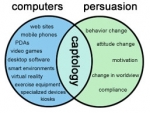Mar 29, 2005
Captology: The science of Persuasive Technology
Can computers change what you think and do? Can they motivate you to stop smoking, persuade you to buy insurance, or convince you to join the Army?
The Stanford Persuasive Technology Lab, founded by BJ Fogg, an experimental psychologist, is trying to answer these questions. The lab creates insight into how computing products -- from websites to mobile phone software -- can be designed to change what people believe and what they do.
Like human persuaders, persuasive interactive technologies can bring about positive changes in many domains, including health, business, safety, and education. With such ends in mind, we are creating a body of expertise in the design, theory, and analysis of persuasive technologies, an area called "captology."
This is how Fogg describes the key concepts of his vision:
"Captology is the study of computers as persuasive technologies. This includes the design, research, and analysis of interactive computing products created for the purpose of changing people's attitudes or behaviors. As the graphic shows, captology describes the area where computing technology and persuasion overlap.

In the last few years we've seen this area grow quickly. Each week more computing products are designed to change what users think and do. We expect this trend to continue, especially as mobile phones become more capable of running third-party software applications.

We've identified over 100 uses for persuasive technology. Hundreds of other uses exist. Whenever there is a need to change what people believe or how they behave, persuasive technology may very well play a role"
More to explore
The web site of the Lab: http://captology.stanford.edu/
Fogg's book "Persuasive Technology"
18:15 Posted in Pervasive computing | Permalink | Comments (0) | Tags: Positive Technology, Ambient intelligence







The comments are closed.